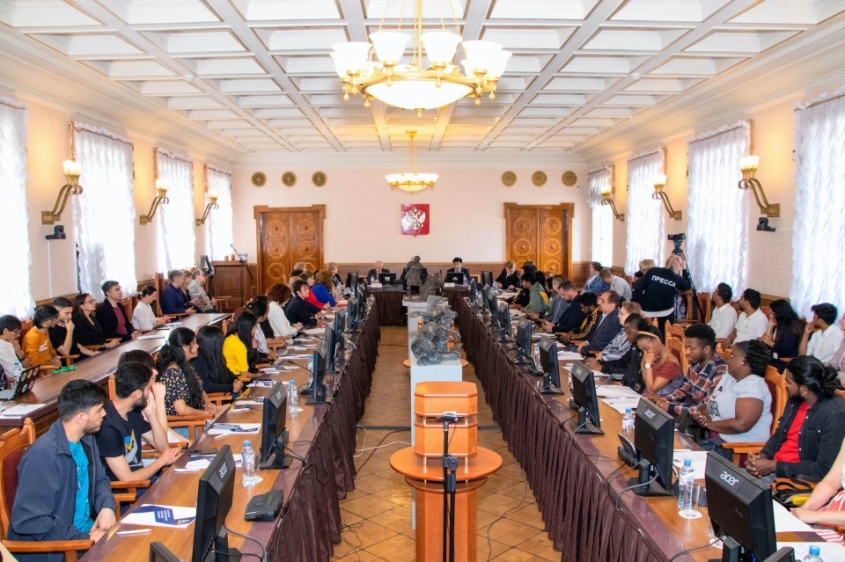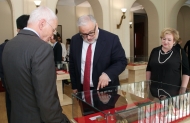
Photo: RGSU
The Russian State Social University hosted the First Eurasian Axiological Forum "Traditional Values: Stability and Development" from 1 to 2 June, dedicated to state and public mechanisms for the protection and development of traditional values of Russian and other civilizations.
The opening of the Forum was attended by the Rector of the Russian State University of Civilization, Academician of the Russian Academy of Arts Andrey Khazin, Chairman of the Board of Trustees of the Russian State University of Civilization, member of the Federation Council of the Russian Federal Assembly Grigory Rapota, Minister Counselor for Culture of the Embassy of the People's Republic of China in the Russian Federation Feng Litao, Chairman of the Russian-Hungarian Culture and Friendship Society, former Hungarian Ambassador to Russia György Gilian, Adviser of the Embassy of the Islamic Republic of Iran, official representative of the Ministry of Science, Education and Health of Iran in Russia, Doctor of Physical and Mathematical Sciences Dr. Hadi Goudarzi, President of the Dungan Association of Kazakhstan, President of the "New Silk Road International Academy" Public Foundation Khusey Daurov, First Deputy Secretary General - Head of the General Secretariat of the Eurasian Peoples’ Assembly Svetlana Smirnova.
Grigory Rapota, Chairman of the Board of Trustees of the Russian State Humanitarian University, Member of the Federation Council of the Federal Assembly of the Russian Federation, delivered a welcoming speech:
"It is very important to understand the role of all the countries that make up the Great Eurasian Partnership in this global mosaic and to clearly represent the role of the Russian Federation in it. It is important to understand how to preserve the uniqueness of each country, including through educational processes, through the education of the younger generation."
"We see that the geopolitical processes of preserving national identity and traditional values initiated by Russia find support all over the world," said Rector of the Russian State University of Higher Education, Academician of the Russian Academy of Arts Andrey Khazin. - "Russia is once again at the forefront of progressive forces, not just defending its economic sovereignty, but also shaping a new world model of cooperation based on mutual respect and equality. The countries whose representatives attended the Forum have different histories and religions. We are different, but in this diversity is our strength. The world should be multipolar, and this is true both for the economy and for the traditional cultural multipolarity.
"Today's world is very complex and dynamic, the processes taking place in it are, without exaggeration, momentous. That is why moral guidelines and traditional values are so important. We believe that patriotism is the most important moral quality of a modern person," stressed Feng Litao, Minister-Counsellor for Culture of the Embassy of the People's Republic of China in the Russian Federation.
"Traditional values are an extremely important topic. We (note – the Eurasian Peoples’ Assembly) developed the project "Happy Family - Happy Country - Happy World", believing that it is in the family that traditional values are preserved... In general, if we talk about our mission, we see it as the formation of consciousness of a person of the third millennium, based on spiritual and moral principles through the tools of public diplomacy", - outlined in her speech Svetlana Smirnova, First Deputy Secretary General of the Eurasian Peoples’s Assembly. She also spoke about the activities of the organization and invited everyone to implement joint projects.
Irina Polyakova, Head of the Spiritual Culture Department of the Eurasia Peoples' Assembly, addressed the plenary session, dedicating her presentation to the role of non-governmental organizations in supporting cultural traditions and spiritual values of the peoples of Eurasia. She described in detail the forms of work of the Eurasia Peoples' Assembly - projects, activities, competitions, etc., carrying values and spiritual and moral content:
"Spiritual culture as a whole is a universal language of humanity, has a reliable potential for the preservation and development of universal values, orienting people towards friendship, spiritual harmony, trust and sustainable partnership. In a multipolar world, culture creates the conditions for international dialogue that can have a key influence on what is happening in the world".
On the first day of the Forum, the Main Building of the Russian State Social University - the former Comintern Executive Committee building - hosted the opening of an exhibition dedicated to the Comintern Faction - the Communist Party of China. The exhibition featured dozens of unique propaganda publications of the 20s-40s of the 20th century, artefacts testifying to the work of the Comintern and the CPC of that time, and household items of their leaders and staff.
In general, the Forum, dedicated to the protection and development of traditional values, aroused the interest of scholars, cultural workers, and education experts of Eurasian countries. Representatives from China, Belarus, Vietnam, Argentina, Kazakhstan, Kyrgyzstan, Tajikistan, Armenia, Azerbaijan, France, India, Indonesia, Turkey, Hungary, South Africa and other countries participated in the Forum.
The Forum lasted for two days. The main issues considered by the participants were the role of traditional values in the state internal and foreign policy, normative-legal assurance of priority and protection of traditional values.



